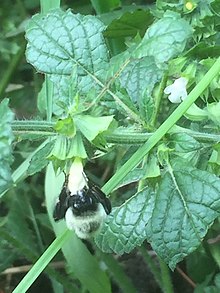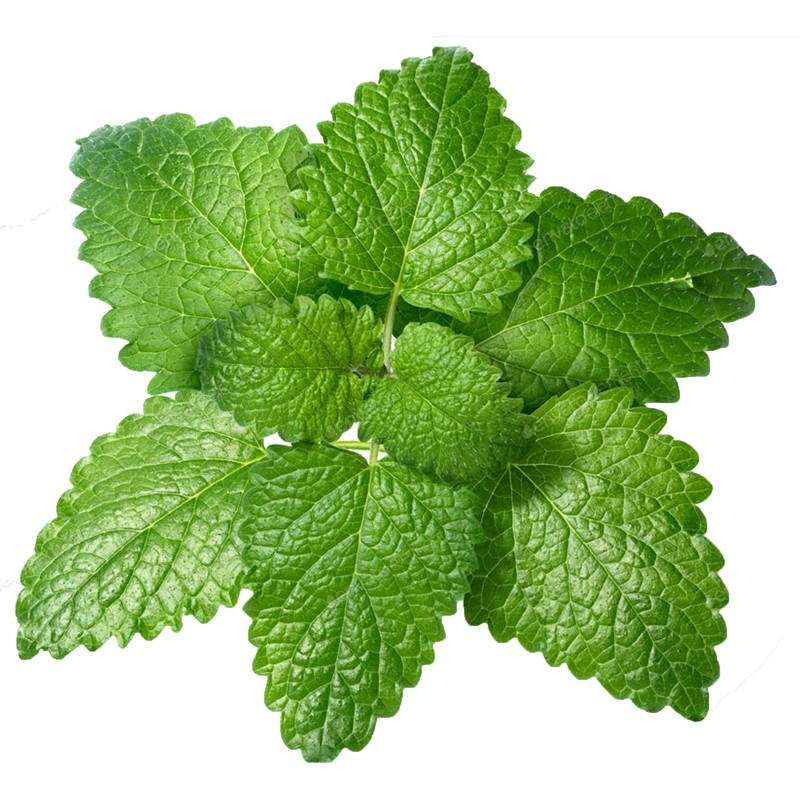
Lemon Balm Seeds (Melissa Officinalis)
Lemon Balm Seeds Herb (Melissa Officinalis)
Price for Package of 1500 (1g) seeds.
Lemon balm (Melissa officinalis), balm, common balm, or balm mint, is a perennial herbaceous plant in the mint family Lamiaceae and native to south-central Europe, the Mediterranean Basin, Iran, and Central Asia, but now naturalized in the Americas and
Lemon Balm Seeds Herb (Melissa Officinalis)
Price for Package of 1500 (1g) seeds.
Lemon balm (Melissa officinalis), balm, common balm, or balm mint, is a perennial herbaceous plant in the mint family Lamiaceae and native to south-central Europe, the Mediterranean Basin, Iran, and Central Asia, but now naturalized in the Americas and elsewhere.
It grows to a maximum height of 70–150 cm (28–59 in). The leaves have a mild lemon scent similar to mint. During summer, small white flowers full of nectar appear. It is not to be confused with bee balm (genus Monarda), although the white flowers attract bees, hence the genus Melissa (Greek for "honey bee").

History and domestication
Sources date the medicinal use of lemon balm to over 2000 years ago through the Greeks and Romans. It is mentioned by Theophrastus in the Historia Plantarum, dated to around 300 BC,[5] as "honey-leaf" (μελισσόφυλλον).[6] Lemon balm was formally introduced into Spain in the 7th century, from which its use and domestication spread throughout Europe.[5] Its use in the Middle Ages is noted by herbalists, writers, philosophers, and scientists, with Swiss physician and alchemist, Paracelsus, deeming it the “elixir of life”.[7][8]It was in the herbal garden of John Gerard, 1596.[9] Lemon balm was introduced to North America with the arrival of early colonists, and is recorded to have been among the herbs cultivated in Thomas Jefferson's garden.[10]
Uses
The plant is used to attract bees to make honey. It is also grown and sold as an ornamental plant. The essential oil is used as a perfume ingredient,[11] but the plant has other culinary and medicinal uses. Lemon balm is used in some toothpastes.[12]
Culinary
Lemon balm is used as a flavouring[11] in ice cream and herbal teas, both hot and iced, often in combination with other herbs such as spearmint. It is a common addition to peppermint tea, mostly because of its complementing flavor.[citation needed]
Lemon balm is also paired with fruit dishes or candies. Additionally, it can be used in fish dishes and is the main ingredient in lemon balm pesto.[13]:15–16 Its flavour comes from citronellal (24%), geranial (16%), linalyl acetate (12%) and caryophyllene (12%).[citation needed]
It is also one of the ingredients in Spreewald gherkins.
Traditional medicine

In traditional Austrian medicine, M. officinalis leaves have been prescribed for internal use—as a tea—or external application—as an essential oil—for the treatment of disorders of the gastrointestinal tract, nervous system, liver, and bile.[14] Lemon balm is the main ingredient of Carmelite water, which is still for sale in German pharmacies.[15]
In alternative medicine it is used as a sleep aid and digestive aid.[16]
Lemon balm essential oil is popular in aromatherapy.[17] The essential oil is commonly co-distilled with lemon oil, citronella oil or other oils.
Folklore and traditional uses
Nicholas Culpeper considered lemon balm to be ruled by Jupiter in Cancer, and suggested it to be used for weak stomachs, to cause the heart to become merry, to help digestion, to open obstructions of the brain, and to expel melancholy vapors from the heart and arteries.[18]
The herbalist John Gerard considered it especially good for feeding and attracting honeybees. The alchemist Paracelsus believed that lemon balm had the power to restore health and vitality.[19] Traditionally, an alchemical tincture of lemon balm was the first tincture an aspiring alchemist made.[20]
Cultivation
Melissa officinalis is native to Europe, central Asia and Iran, but is now naturalized around the world.
Lemon balm seeds require light and at least 20 °C (70 °F) to germinate. Lemon balm grows in clumps and spreads vegetatively, as well as by seed. In mild temperate zones, the stems of the plant die off at the start of the winter, but shoot up again in spring. Lemon balm grows vigorously; it should not be planted where it will spread into other plantings.
As of 1992, the major producing countries were Hungary, Egypt, and Italy for herb, and Ireland for essential oil.
Medical research
Sleep
Lemon balm, including lemon balm extract, has been shown to improve sleep quality.[23][24][5] Pediatric patients have displayed improvement in restlessness and dyssomnia with the ingestion of lemon balm extract.[23]Further evidence has demonstrated a significant reduction in levels of insomnia.[24]
Anxiety and depression
Lemon balm is commonly associated with anti-stress and anti-anxiety.[25][26][27] Studies have shown a significant increase in calmness in healthy patients exposed to lemon balm when compared to placebo.[25] In addition, lemon balm ingestion is linked to improvement in mood and cognitive performance.[26][25] Gender and administration length appear to have an impact on the effectiveness of lemon balm as a treatment for depression in rats.[27]
Antioxidant
Several studies have demonstrated the lemon balm's antioxidant activity, obtained through high amounts of flavonoids, rosmaric acid, gallic acid and phenolic contents.[28][29][7]
Additional properties
Lemon balm has also been shown to possess antimicrobial, antiviral, antispasmodic and antitumoral properties.
The composition and pharmacology and potential uses of lemon balm have been extensively studied, especially with regard to its traditional uses.[32] Randomized, double-blinded clinical studies in people, however, have been limited and have had few subjects. Those studies cannot be used for generalized conclusions about the safety or efficacy of lemon balm and its components; what doses are safe and effective is especially not clear.[32]
Chemistry
Lemon balm contains eugenol, tannins, and terpenes.[33] It also contains (+)-citronellal, 1-octen-3-ol, 10-α-cadinol, 3-octanol, 3-octanone, α-cubebene, α-humulene, β-bourbonene, caffeic acid, caryophyllene, caryophyllene oxide, catechin, chlorogenic acid, cis-3-hexenol, cis-ocimene, citral A, citral B, copaene, δ-cadinene, eugenyl acetate, γ-cadinene, geranial, geraniol, geranyl acetate, germacrene D, isogeranial, linalool, luteolin-7-glucoside, methylheptenone, neral, nerol, octyl benzoate, oleanolic acid, pomolic acid ((1R)-hydroxyursolic acid), protocatechuic acid, rhamnazin, rosmarinic acid, stachyose, succinic acid, thymol, trans-ocimene and ursolic acid.[34][35] Lemon balm may contain traces of harmine.[36]
Rosmarinic acid appears to be the most important active component, but the interaction of chemicals within lemon balm, and with chemicals in other herbs with which it has been commonly used in traditional medicines, is poorly understood.[32] Lemon balm leaf contains roughly 36.5 ± 0.8 mg rosmarinic acid per gram.
| Organic Seeds ? | Organic Seeds |
|---|---|
| Organic/natural ? | Organic/Natural: Yes |
| Edible ? | Edible |
| Plant is suitable for growing ? | The plant is suitable for growing in a greenhouse The plant is suitable for growing on a balcony-terrace The plant is suitable for outdoors cultivation |
| Suitable for growing in flower pot ? | Suitable for pot: Yes |
| Medicinal Plant ? | Medicinal Plant: Yes |
| Seeds requires light for germination ? | Requires light for germination |


Uw beoordelingswaardering kan niet worden verzonden
Rapporteer reactie
Melding verzonden
Uw opmerking kan niet worden verzonden
Schrijf uw recensie
Beoordeling verstuurd
Uw beoordeling kan niet worden verzonden
🌍 Wereldwijde verzending vanuit de EU
Wij versturen wereldwijd vanuit de Europese Unie via aangetekende post met ontvangstbevestiging.
📦 Pakket volgen
Log in op je account en ga naar Bestelhistorie > Details om je track & trace-nummer te vinden.
Wereldwijde tracking: 17Track
Voor nummers zoals RGxxxxxxHR: Posta.hr tracking
🕒 Wacht minimaal 24 uur na verzending voordat trackinginformatie beschikbaar is.
⚠️ Belangrijke informatie
Betalen bij aflevering is niet mogelijk.
Controleer regelmatig je spam- of ongewenste mailfolder voor belangrijke e-mails.
Gebruik uitsluitend het contactformulier op onze website.
Directe e-mails worden mogelijk niet beantwoord.
📱 Telefoonnummer verplicht
Vermeld bij je bestelling altijd je mobiele telefoonnummer inclusief landcode.
Voorbeeld: +31 6 12345678
🚚 Leveringsvoorwaarden
Aangetekende zendingen vereisen een handtekening van de ontvanger.
Bestel niet als:
Je pakket in een brievenbus geleverd moet worden
Je niet thuis bent om het pakket in ontvangst te nemen
Je wilt dat het pakket bij de buurman wordt bezorgd (❌ niet mogelijk)
📬 Als je een brievenbusadres opgeeft en het pakket kwijt raakt, heb je geen recht op terugbetaling.
↩️ Retourzending en opnieuw verzenden
Als een pakket om welke reden dan ook wordt geretourneerd:
Ben je verantwoordelijk voor retourkosten van €2
En de verzendkosten voor het opnieuw verzenden
⏱ Vertragingen en tracking
Als de tracking aangeeft dat het pakket nog bij de verzender is, betekent dit dat het pakket onderweg is.
Neem contact op met je lokale postkantoor met het trackingnummer voor de meest actuele info.
Wij zijn geen postbedrijf en kunnen het pakket niet voor je volgen.
Wij zijn niet verantwoordelijk voor de levertijd.
🔍 Een onderzoek naar verloren pakketten kan pas gestart worden 30 dagen na verzenddatum.
✈️ Verzendopties
| Verzendmethode | Verwerkingstijd | Verzekering | Mogelijke vertraging | Opmerking |
|---|---|---|---|---|
| Standaard | 7–10 werkdagen | ❌ | 7–14 werkdagen | Goedkoopste optie |
| Prioriteit | 1–7 werkdagen | ❌ | 3–10 werkdagen | Prioriteit in verwerking, niet gegarandeerd sneller |
| Verzekerd | 1–7 werkdagen | ✅ | 3–10 werkdagen | Geld terug bij verlies (tot €150) |
🕒 Geschatte levertijd:
Binnen de EU: 3–20 werkdagen
Wereldwijd: 5–30 werkdagen
Voorbeelden levertijden VS: 27, 22, 19, 17, 13 dagen
💳 Betaalmethoden
💶 Bankoverschrijving (SEPA / IBAN / SWIFT-BIC)
Vermeld altijd je bestelnummer in de omschrijving (bijv. SGS-19811702).
Bij het ontbreken van deze referentie kan je bestelling vertraagd worden of geannuleerd.
Bestellingen die niet binnen 7 dagen betaald zijn, worden automatisch geannuleerd.
🅿️ PayPal
We accepteren alleen betalingen in euro’s via PayPal.
Kies tijdens het betaalproces voor de valuta euro.
💳 Betaling met kaart
Betaling verloopt via onze website: Exotic Seeds Store
We accepteren Visa, MasterCard, American Express, Diners Club, UnionPay, JCB, Discover en meer.
💡 De klant draagt eventuele transactiekosten.
Stuur bij voorkeur een betaalbewijs mee voor een snellere verwerking.
📅 Overige informatie
Wij verwerken en versturen geen bestellingen in het weekend (zaterdag en zondag).
Controleer altijd de belangrijke mededelingen op onze website (feestdagen, speciale voorwaarden e.d.).
📫 Let op:
Stuur geen e-mails rechtstreeks naar ons. Gebruik alleen het contactformulier op onze website voor vragen.
Related Products













